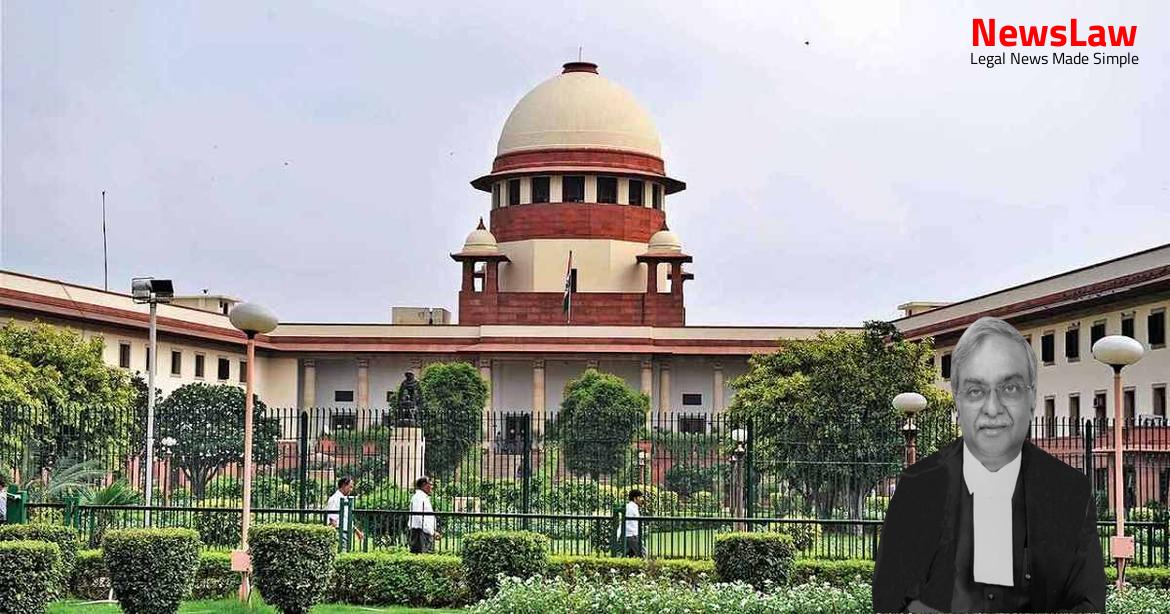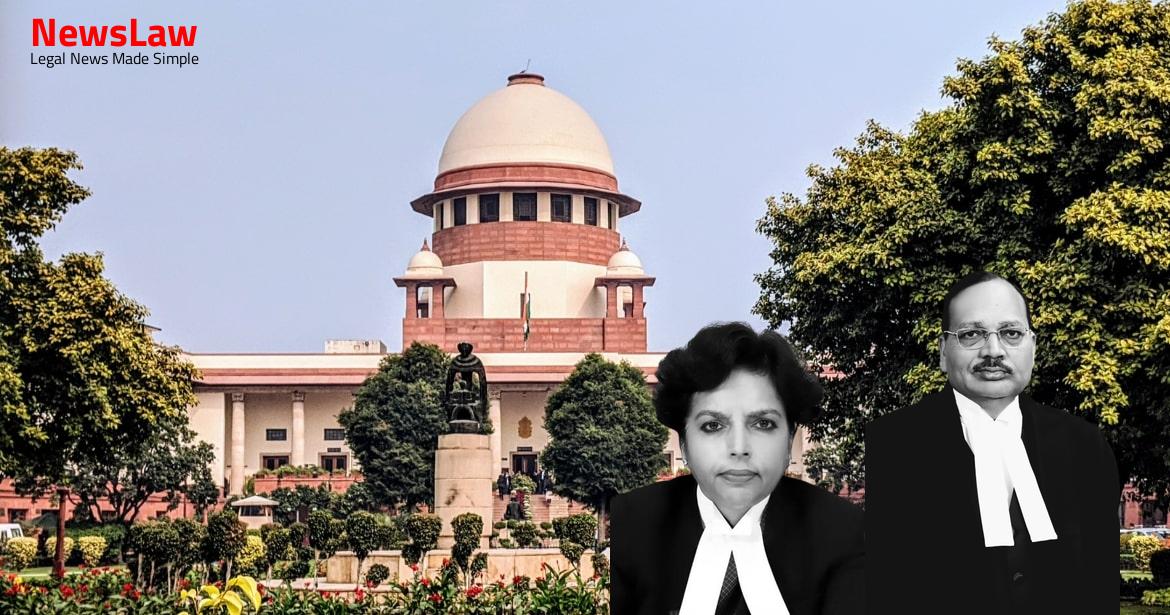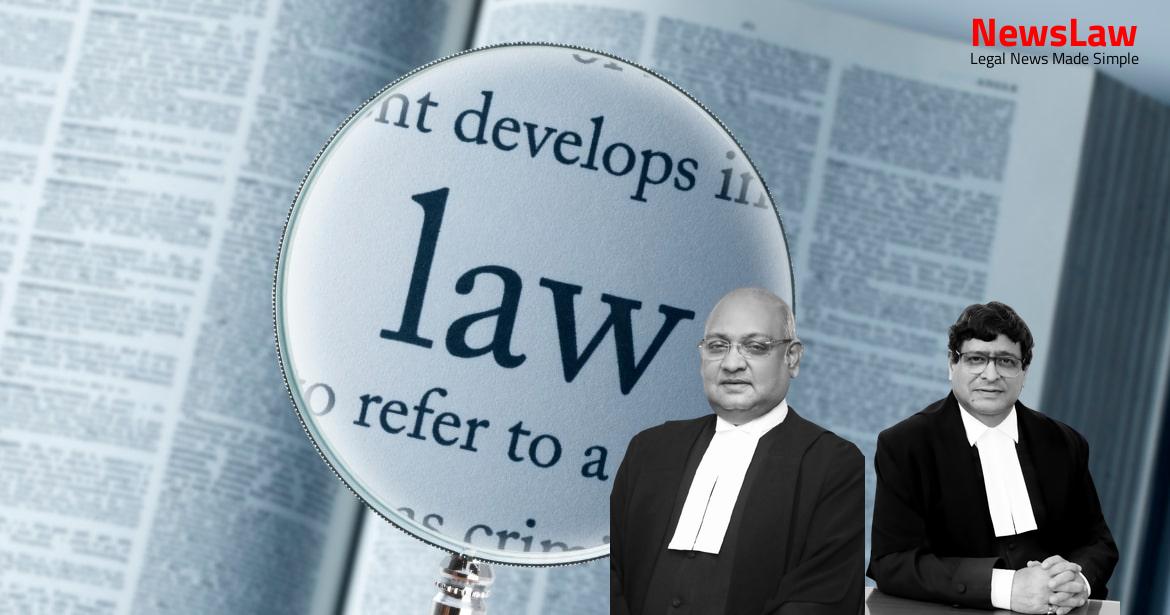The legal case delves into the court’s meticulous analysis of jurisdictional issues in segregating charges related to different offenses in a criminal case. The court’s emphasis on the principles of jurisdiction and territorial aspects offers insights into the complexities of legal proceedings in such scenarios. Let’s delve deeper into the nuances of the court’s decision-making process.
Facts
- Shakuntala Devi filed a complaint to the superintendent of police, Distt. Chamoli on 16.12.2016.
- The allegations include being subjected to sexual intercourse against her wishes by respondent No 2 in Delhi in February 2016.
- Shakuntala Devi’s mother filed a complaint against the accused in P.S. Gairsain, Distt. Chamoli on 12.12.2016.
- Respondent No 2 demanded money and refused to marry Shakuntala after the demand was not met.
- The respondent also hurled abuses and threatened to kill Shakuntala.
- A complaint was filed under Section 156(3) CrPC before the Judicial Magistrate First Class, Gairsain, District Chamoli due to police inaction.
- Both parties were referred for counselling to women cell Gopeshwar, which was unsuccessful.
- The accused was acquitted under section 376 IPC due to lack of territorial jurisdiction.
- The matter was remitted to the Court of Judicial Magistrate for trial of remaining offences under Sections 504 and 506 IPC.
- The Judicial Magistrate found that the prosecution witnesses failed to prove the accused’s actions of hurling abuses or giving death threats.
- The High Court declined to interfere with the Sessions Judge’s order of discharging the accused under Section 376 IPC with the liberty to prosecute in the appropriate Court.
- The High Court mentioned that in case of acquittal, the Appellate Court would not reverse the finding unless it was perverse, which was not the case here.
Also Read: Ensuring Maintenance Rights: Court’s Legal Analysis
Arguments
- The Sessions Judge erroneously discharged the accused-respondent No. 2 of the offence under Section 376 IPC due to lack of territorial jurisdiction.
- The High Court summarily dismissed the petition without providing reasons for its conclusion.
- Appellant’s counsel argues that the offences under Sections 376, 504, and 506 IPC are part of the same transaction and should not have been segregated.
- Reference to the case of State of Punjab v. Gurmit Singh and Ors. (1996) 2 SCC 384 regarding the victim’s assertions in sexual offence cases.
- Trial for offences under Sections 504 and 506 IPC, where accused-respondent No. 2 was acquitted, should be quashed as it was segregated from the Section 376 IPC offence.
- Accused-respondent No. 2 should face trial for the offence under Section 376 IPC along with the offences under Sections 504 and 506 IPC.
- Counsel for the accused-respondent argues that separate charges for separate offences are required as per Section 218 CrPC.
- The segregation of charges by the Sessions Judge resulted in a miscarriage of justice as the offences were part of the same transaction.
- Reference to the case of Satvinder Kaur v. State (Govt. of NCT of Delhi) and Anr. (1999) 8 SCC 728 supporting the contention of same transaction for the offences.
- Consistent stand of the appellant regarding being subjected to forcible sexual intercourse by respondent No. 2 under threat of ending the matrimonial alliance.
- The trial conducted by the Judicial Magistrate for charges under Sections 504 and 506 IPC after segregation from Section 376 IPC is deemed vitiated as per Clause (l) of Section 461 CrPC.
- In rape cases, the solitary evidence of the prosecutrix without corroboration is sufficient to hold the accused guilty.
- High Court misinterpreted the discharge of accused-respondent No. 2 as an acquittal under Section 232 CrPC when it was actually a discharge under Section 227 CrPC.
- The alleged incident of physical relationship occurred in Delhi, leading to the correct segregation of the offence under Section 376 IPC.
- Evidence collected during investigation supported that the alleged offence under Section 376 IPC happened only in Delhi and not in Chamoli.
- The nature of accusations and circumstances justified segregating the offence under Section 376 IPC in the present case.
- Respondent No 2 is being harassed by the appellant for more than 5 years.
- An inordinate delay of 1 year in registration of FIR from the alleged date of incident is highlighted.
- Criminal machinery is argued not to be used for the purpose of harassment and vengeance.
- Life and liberty of respondent No 2 are claimed to be at severe risk due to baseless allegations.
- The use of ‘acquittal’ instead of ‘discharge’ in the High Court’s order is attributed to human error.
- Allegations of rape are deemed a concocted story by respondent No 2.
- Delay in lodging the FIR is emphasized.
- State counsel supports the prosecution’s stance that the solitary evidence of the prosecutrix could be adequate to prove the accused guilty of rape.
- Accused (respondent No 2) was acquitted of charges under Sections 504 and 506 IPC by the Judicial Magistrate due to lack of material evidence.
- The error in terminology in the High Court order is considered insignificant and does not overshadow the fact that the Sessions Judge rightly discharged the appellant of the offence under Section 376 IPC due to lack of territorial jurisdiction.
- The consistent stand of the appellant is under scrutiny.
Also Read: Analyzing Evidentiary Value in Criminal Conviction Case
Analysis
- The matter involves allegations against the accused of committing rape, hurling abuses, and extending threats under different sections of IPC.
- The completed act of one offense (Section 376 IPC) cannot be connected to other acts leading to different offenses.
- Various factors like proximity of time, unity or proximity of place, continuity of action, and community of purpose are considered to determine if acts form the same transaction.
- The High Court entertained the petition of Respondent 2 on the ground of lack of territorial jurisdiction despite the specifics of the case.
- The High Court’s order was challenged by the appellant concerning the segregation of charges and the discharge of the accused under Section 376 IPC.
- The question of jurisdiction was raised, and the multiple local areas involved were considered based on the provisions of the Criminal Procedure Code.
- The verdict of the learned Sessions Judge segregating the offenses was found to be valid and in accordance with the jurisdictional aspects of the case.
- The orders passed by lower courts were challenged and the High Court’s decision to accept the lack of territorial jurisdiction was analyzed.
- The allegations of different offenses at different places but involving the same individuals were a point of contention.
- The principle of ‘same transaction’ under Section 220 CrPC was considered in relation to the offenses charged against the accused.
- The trial for the offenses under Sections 504 and 506 IPC was discussed in the context of the segregation of charges.
- The judgment highlighted the importance of continuity of actions and unity of purpose in determining if acts form the same transaction.
- Various legal provisions under the Criminal Procedure Code were referenced to justify the jurisdictional decisions in the case.
- The completion of the act of offense at Delhi and the threats received by the victim at a different location were crucial aspects in the analysis.
- The importance of common purpose or design and continuity of actions in defining the ‘same transaction’ was reiterated.
- The practical application of legal principles to the factual scenario of the case was emphasized throughout the analysis.
- Offences shall be inquired into and tried by a Court within the local jurisdiction where the offence was committed.
- Offences committed in uncertain local areas may be tried by a Court having jurisdiction over any of such areas.
- Offences triable where the act is done or consequence ensues.
- Protection against double jeopardy under Article 20(2) of the Constitution of India and Section 300 of the Code of Criminal Procedure, 1973.
- Provisions regarding trial for more than one offence under Section 300 and Section 218 of the Code of Criminal Procedure, 1973.
- References to separate charges for distinct offences and trying multiple charges together if desired by the accused and not prejudicial.
- Provisions for trying more than one offence committed by the same person in a single trial.
- Cases where several acts combine to constitute a different offence allowing the accused to be charged and tried together.
- Definition of ‘same transaction’ is inherently vague and cannot be universally defined.
- Common sense should be used to determine if multiple acts constitute the same transaction.
- Material collected during investigation cannot be judicially scrutinized for jurisdictional purposes.
- Sections 177 and 220 of CrPC outline the parameters for determining territorial jurisdiction and power to investigate.
- Cases where offenses are continuing acts happening at different locations are covered under Section 178(c) of CrPC.
- Core elements for determining ‘same transaction’ include proximity of time, unity or proximity of place, continuity of action, and community of purpose.
- Tests for determining ‘same transaction’ involve common sense and ordinary use of language.
- The law allows for a common trial or common FIR for acts forming the same transaction under Section 220 of the Code.
- Exceptions to the concept of ‘same transaction’ may be implied from other provisions of law for convenience of joint trial.
- The expression ‘same transaction’ cannot be artificially or technically interpreted and lacks an exact definition.
Also Read: Legal Authority and Res Judicata in Representation Matter
Decision
- The revision lacks merit and is dismissed.
- The appeal fails and is dismissed.
Case Title: MS. P XXX Vs. THE STATE OF UTTARAKHAND (2022 INSC 648)
Case Number: Crl.A. No.-000903-000903 / 2022



